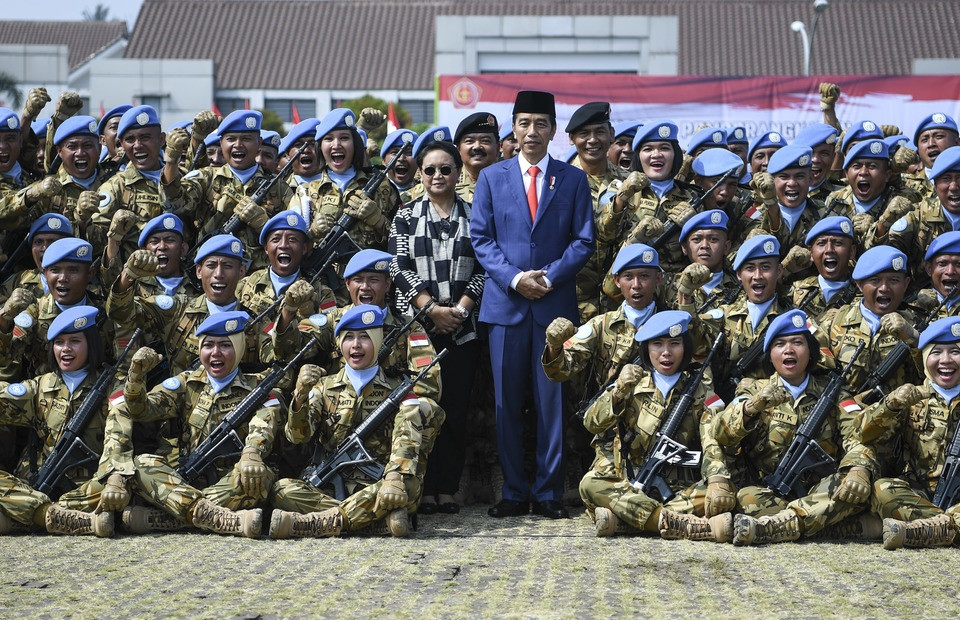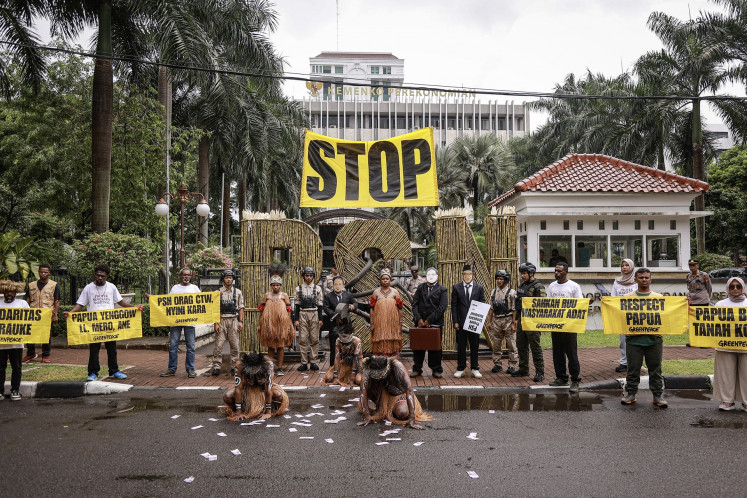Popular Reads
Top Results
Can't find what you're looking for?
View all search resultsPopular Reads
Top Results
Can't find what you're looking for?
View all search resultsUsing gender sensitive data to inform climate security planning
Gender security issues have become essential to mainstream planning for governments and militaries.
Change text size
Gift Premium Articles
to Anyone
T
here is a growing consensus at the national and grassroots levels that women must be engaged as leaders and essential contributors in responding to the challenges of global peace and security.
Within the Women, Peace and Security (WPS) agenda, the issue of climate security presents a multifaceted test to humanity’s ability to collectively solve problems. Climate change can exacerbate violence, conflict, and human-induced threats and hazards across the world, especially if women’s voices are absent from our response strategies.
One of the major gaps in identifying and understanding the scope of local climate security risks is gender-disaggregated data. Given the complexity of the challenges we face, an “all-hands-on-deck” approach is required. Yet, a lack of comprehensive understanding of the critical elements of these issues and how society is affected and should respond has hobbled decision-making.
A 2022 collaborative study by the United States Indo-Pacific Command (INDOPACOM) and the University of Hawaii’s applied science and research center, known as the Pacific Disaster Center (PDC), produced a science-based assessment of the key drivers of risk and vulnerability. This Gender Responsiveness Baseline Assessment study provides new insights on WPS and climate insecurity.
This effort was the first time the US Department of Defense commissioned a research project to obtain an accurate picture of gender trends across the globe, with a specific focus on Indo-Pacific region.
The study stems from the 2000 United Nations Security Council Resolution 1325 and is guided by the US Women, Peace, and Security Act of 2017. With this study, future US initiatives on security, peace-making, and peacekeeping will include considerations of climate change and those impacted by it, in particular women.
Compared to previously gender-blind information gathering efforts, the study provides additional input that can address gender-based destabilizing factors. Data collection with a gender perspective sheds light on the root causes of instability and will assist partner nations in understanding the security needs of men, women, boys, and girls who are affected differently by conflict and crisis.
The baseline assessment analysis also gives practitioners and planners a new tool to support clearer analysis and planning.
Moreover, the assessment supports the development of 10-year government plans at US embassies around the globe, specifically on the US Strategy to Prevent Conflict and Promote Stability in partner countries. The study also provides an analytic framework for collecting consistent gender data with quantifiable metrics that can be used to measure WPS program effectiveness, as well as drive data-informed operations, activities, and investments, including but not limited to security cooperation.
The breakthrough offered by this study is that indicators are used in a cross-cutting manner to identify factors that impinge upon gender-based security concerns. In particular, the study measures gender responsiveness based on economic opportunity, government participation, law, health care access, advanced education, and security capacity.
It also analyzes gender inequality based on information access, health outcomes, economic participation, clean water/sanitation access, and personal security. Ultimately, PDC’s research provides a framework for understanding gender-based insecurity related to conflicts, non-state malign actors, climate change, and maritime security.
Going forward, INDOPACOM, as one of the six geographic combatant commands of the US, has made a commitment to leverage the WPS analysis for security planning activities. The baseline assessment will be used by INDOPACOM to work with partner nations to eliminate barriers to women’s participation in national security forces and programming.
The use of gender sensitive data represents a paradigm shift for INDOPACOM, and is expected to build capacity and support a more holistic understanding of security in the region.
Nevertheless, while data is important, so are the actual voices of women. Engaging in consultations with women’s civil society organizations regarding climate change concerns is essential.
Women should be consulted as sources of climate security innovators and champions. Incorporating their ideas and solutions into community strengthening strategies is important to increase the number of system-level resources and tools available for achieving climate resilience and avoiding climate-driven conflicts.
Moreover, data is only effective when it can be used to empower action. Hence, PDC’s gender-climate security data and analysis must be shared with local governments, security agencies, and importantly also with women’s groups to develop disaster plans and climate resilience strategies at the local level. These organizations and agencies should also be adequately trained and funded in order to implement such plans.
International engagement in WPS issues has reached a point at which the broadening perspectives on security and the utilization of science-based methodologies and tools to assess climate vulnerabilities is widely acknowledged. Gender security issues have become essential to mainstream planning for governments and militaries.
The objective is to ensure that underrepresented populations, especially women, are included in analyses and implementation across all domains of responding and adapting to climate change. Without this approach, the aims of the WPS agenda to address the intersection of gender and climate security cannot be realized.
***
Steve Recca is executive director of the Center for Human Security at the University of Colorado and humanitarian assistance program advisor at Pacific Disaster Center. Maryruth Belsey Priebe is director for women, peace and security programs and senior fellow at Pacific Forum.











